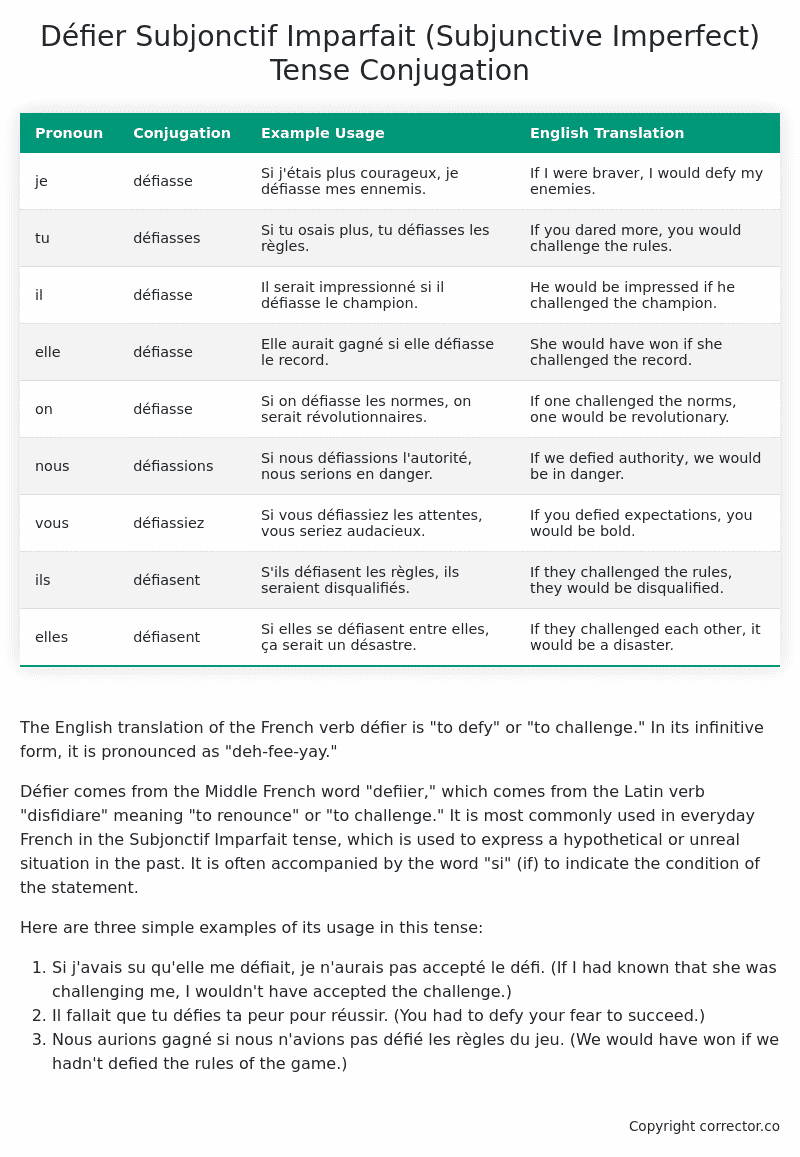Subjonctif Imparfait (Subjunctive Imperfect) Tense Conjugation of the French Verb défier
Introduction to the verb défier
The English translation of the French verb défier is “to defy” or “to challenge.” In its infinitive form, it is pronounced as “deh-fee-yay.”
Défier comes from the Middle French word “defiier,” which comes from the Latin verb “disfidiare” meaning “to renounce” or “to challenge.” It is most commonly used in everyday French in the Subjonctif Imparfait tense, which is used to express a hypothetical or unreal situation in the past. It is often accompanied by the word “si” (if) to indicate the condition of the statement.
Here are three simple examples of its usage in this tense:
- Si j’avais su qu’elle me défiait, je n’aurais pas accepté le défi. (If I had known that she was challenging me, I wouldn’t have accepted the challenge.)
- Il fallait que tu défies ta peur pour réussir. (You had to defy your fear to succeed.)
- Nous aurions gagné si nous n’avions pas défié les règles du jeu. (We would have won if we hadn’t defied the rules of the game.)
Table of the Subjonctif Imparfait (Subjunctive Imperfect) Tense Conjugation of défier
| Pronoun | Conjugation | Example Usage | English Translation |
|---|---|---|---|
| je | défiasse | Si j’étais plus courageux, je défiasse mes ennemis. | If I were braver, I would defy my enemies. |
| tu | défiasses | Si tu osais plus, tu défiasses les règles. | If you dared more, you would challenge the rules. |
| il | défiasse | Il serait impressionné si il défiasse le champion. | He would be impressed if he challenged the champion. |
| elle | défiasse | Elle aurait gagné si elle défiasse le record. | She would have won if she challenged the record. |
| on | défiasse | Si on défiasse les normes, on serait révolutionnaires. | If one challenged the norms, one would be revolutionary. |
| nous | défiassions | Si nous défiassions l’autorité, nous serions en danger. | If we defied authority, we would be in danger. |
| vous | défiassiez | Si vous défiassiez les attentes, vous seriez audacieux. | If you defied expectations, you would be bold. |
| ils | défiasent | S’ils défiasent les règles, ils seraient disqualifiés. | If they challenged the rules, they would be disqualified. |
| elles | défiasent | Si elles se défiasent entre elles, ça serait un désastre. | If they challenged each other, it would be a disaster. |
Other Conjugations for Défier.
Le Present (Present Tense) Conjugation of the French Verb défier
Imparfait (Imperfect) Tense Conjugation of the French Verb défier
Passé Simple (Simple Past) Tense Conjugation of the French Verb défier
Passé Composé (Present Perfect) Tense Conjugation of the French Verb défier
Futur Simple (Simple Future) Tense Conjugation of the French Verb défier
Futur Proche (Near Future) Tense Conjugation of the French Verb défier
Plus-que-parfait (Pluperfect) Tense Conjugation of the French Verb défier
Passé Antérieur (Past Anterior) Tense Conjugation of the French Verb défier
Futur Antérieur (Future Anterior) Tense Conjugation of the French Verb défier
Subjonctif Présent (Subjunctive Present) Tense Conjugation of the French Verb défier
Subjonctif Passé (Subjunctive Past) Tense Conjugation of the French Verb défier
Subjonctif Imparfait (Subjunctive Imperfect) Tense Conjugation of the French Verb défier (this article)
Subjonctif Plus-que-parfait (Subjunctive Pluperfect) Tense Conjugation of the French Verb défier
Conditionnel Présent (Conditional Present) Tense Conjugation of the French Verb défier
Conditionnel Passé (Conditional Past) Tense Conjugation of the French Verb défier
L’impératif Présent (Imperative Present) Tense Conjugation of the French Verb défier
L’infinitif Présent (Infinitive Present) Tense Conjugation of the French Verb défier
Struggling with French verbs or the language in general? Why not use our free French Grammar Checker – no registration required!
Get a FREE Download Study Sheet of this Conjugation 🔥
Simply right click the image below, click “save image” and get your free reference for the défier Subjonctif Imparfait tense conjugation!

Défier – About the French Subjonctif Imparfait (Subjunctive Imperfect) Tense
Formation
Common Everyday Usage Patterns
Interactions with Other Tenses
Subjonctif Présent
Indicatif Passé Composé
Conditional
Conditional Perfect
Summary
I hope you enjoyed this article on the verb défier. Still in a learning mood? Check out another TOTALLY random French verb conjugation!


